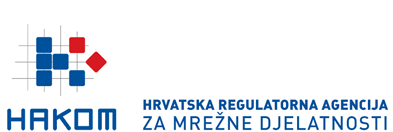International postal traffic increased and HŽ Cargo gets competitionNEWS
Market indicators of the third quarter of 2014 show a continued increase of the share of international traffic on the postal services market. At the same time, on the rail services market, the number of carried passengers decreased but freight traffic increased. New freight carriers appeared for the first time on this market.
# # #ZAGREB, 28 November 2014 – The liberalized postal services market and the accession of the Republic of Croatia to the European Union have, from the very beginning, had a positive impact on the international postal traffic. The share of services in the international traffic has been growing continuously and currently amounts to more than seven percent of total traffic on the postal services market. This is particularly noticeable in the international outgoing traffic where the decrease and adjustment of prices towards EU Member States had the greatest impact. Decrease in the number of total provided services in the third quarter did not have a negative impact on the revenue on the market but resulted in higher revenue than in the previous quarter, which is related to the mentioned services in international traffic, and, in part, to the provision of postal services of greater value. The share of HP- Hrvatska pošta d.d. on the postal services market did not change significantly compared to the previous quarter and it is still the most significant provider with a market share of 70 %. The rail services market recorded a 13% decrease in the number of passengers compared to the same quarter of 2013, while the share of freight traffic increased by two percent in the same period. Passenger and freight trains covered more than 5 million of train kilometres on the rail infrastructure, which is around 1 percent more than in the previous quarter, and eight percent less compared to the same quarter of the previous year. Concerning the rail infrastructure access service, more than a billion of gross tonne kilometres was realized, which is slightly more compared to the previous quarter and equivalent to the same quarter of the previous year. It must be stressed that, for the first time in the history of railway traffic in the Republic of Croatia, in the third quarter of 2014 there were three new carriers in railway traffic, in addition HŽ Cargo. Their share in the freight rail traffic in the third quarter amounted to 1.3 percent in total train kilometres. Data and market indicators in the third trimester are available on HAKOM’s website at the following link: default.aspx?id=29 For additional information please contact: Croatian Regulatory Authority for Network Industries (HAKOM) Roberta Frangeša Mihanovića 9 10110 Zagreb, Croatia Tel. + 385 (0) 1 700 70 07 Fax + 385 (0)1 700 70 70 Media inquiries can be submitted online using HAKOM’s official website: Registration required. ABOUT HAKOM: HAKOM (www.hakom.hr) - Croatian Regulatory Authority for Network Industries – ensures preconditions for a fair market competition, stable growth and environment for innovations in the electronic communications and postal services market. HAKOM protects users’ interests and the possibility of choice among various communications and postal services at affordable prices, defines sustainable competitive conditions for operators and service providers under fair conditions for return on investment, and provides support to economic growth, public services and the quality of life in the Republic of Croatia by using modern technologies. HAKOM’ strategic goals are: to promote regulation of the electronic communications and postal services market, to support growth of investments and innovations in the electronic communications and postal services market, to provide efficient use of limited resources, to accelerate the growth of broadband products and services, to provide affordable offers of communications and postal services, to provide protection and informing of users, to build an efficient and comprehensive information system, to define and implement efficient processes, and to acquire multi-disciplinary competencies in market regulation. |
 |
|
|